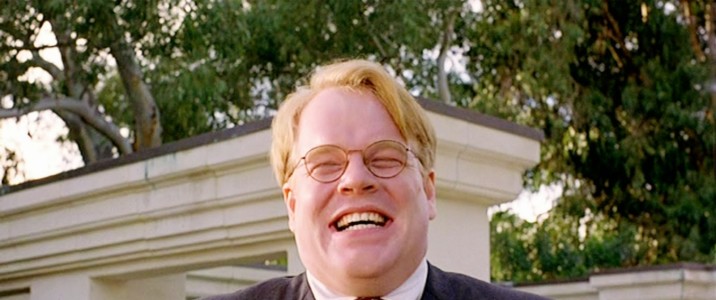Where does one even begin? Philip Seymour Hoffman, who died earlier today in his Manhattan apartment at the age of 46, was that exceedingly rare actor who left an indelible impression despite the fact that he could hardly be called a leading man. But looking back upon his filmography, one can easily see a man who was arguably the most eclectic actor of his generation. He was an invaluable addition to any ensemble, and he could play any role, heroic and villainous, noble and despicable, comedic and tragic. And he made it all seem so effortless.
Hoffman, who received his Bachelor of Fine Arts from the Tisch School of the Arts in New York University in 1989, had his first role in an episode of Law and Order back in 1991 but got his foot in the door a year later by starring in four feature films, including Leap of Faith and, most notably, Scent of a Woman. Near the end of the decade, Hoffman established a reputation as one of Hollywood’s brightest talents, a guy who could be the comic relief in an action blockbuster like Twister and only a year later star in Boogie Nights as a tortured soul whose crippling self-loathing and impossible infatuation with a porn star made him one of that film’s saddest characters in an American Epic full of sad characters.
Boogie Nights was the second of many collaborations between Hoffman and then-newcomer director Paul Thomas Anderson. Hoffman would go on to star in every film Anderson directed, save for There Will Be Blood, and one could dedicate an entire tribute to the actor focusing on these roles alone. You won’t find a better example of Hoffman’s range as an actor than in these films. In Magnolia, he played a kindly nurse who dedicates himself to making amends between a dying man and his estranged, enraged son. In The Master, he was the equal to Joaquin Phoenix’s animalistic drifter as a venerable spiritual pioneer who was barely able to mask his own primal instincts. And despite the fact that he was in the film for what could barely amount to around ten minutes, he stole the show in Punch-Drunk Love as the slimy Dean Trumbell, a pimp doubling as the owner of a mattress store in Utah who pushes Adam Sandler a little too far. Here, while never betraying the intense tone of the film, Hoffman makes Dean a vile scumbag whose aggressive nature makes him as much of a grotesque buffoon as an imposing threat.
Yet Anderson was not the only director Hoffman would have a fruitful working relationship with. Films by Anthony Minghella, Spike Lee, Joel and Ethan Coen, Todd Solondz, and Cameron Crowe, just to name a few, all featured Hoffman in unforgettable roles. Yet Hoffman himself wouldn’t win an Oscar until his performance as Truman Capote in the 2005 biopic Capote, which dealt with the writing of the author’s most famous book In Cold Blood. Hoffman doesn’t merely adapt a funny voice and specific mannerisms to show that he’s “acting”: in a scene where a dinner discussion turns somber, his Capote is a born storyteller, a man who can effortlessly transition from an amusing anecdote to painful truths about human nature. The actor disappears, and there is only the storyteller remaining.
Hoffman would continue playing supporting roles in movies, though he by no means plateaued into comfortable mediocrity. On the contrary, some of his best and most adventurous work was in the last eight years of his career. He’d remain a viable presence in theater, the medium that gave him his talent, as Willy Loman and the treacherous Iago in stage revivals of Death of a Salesman and Othello, respectively. He also starred in the lead role of the play Jack Goes Boating which Hoffman would later adapt to film as his directorial debut in 2010. And Hoffman’s status as Hollywood’s go-to working actor never faltered, playing memorable characters in blockbusters (Mission Impossible III, The Hunger Games: Catching Fire) and independent films, perhaps the most ambitious of which was the lead in Charlie Kaufman’s directorial debut Synecdoche, New York. Kaufman’s opus contains a thematic heft that it wouldn’t be able to sustain were it not for Hoffman’s performance as a neurotic, self-absorbed fool who attempts to create something that does nothing less than encapsulate the entirety of human experience. Yet he has his own story, and he is robbed of some of what he holds most dear by external forces as by himself. Here, he attempts to reconcile with the daughter that’s grown up with a manipulated view of her father. It’s a scene imbued with as much black comedy as unbearable sadness, but it is Hoffman who gives the playwright an aching, recognizable humanity that works in conjunction with Kaufman’s intellectual and layered writing.
And there are still so many films I haven’t even mentioned, and many more I’ve only alluded to. It’s a testament to Hoffman’s genius as an actor that even in dreck like Patch Adams or Along Came Polly he still managed to elevate the material he was given to work with. And think on some of his sterling examples: 25th Hour, The Big Lebowski, Happiness, Mary & Max, Red Dragon, The Talented Mr. Ripley. All, quite frankly, an embarrassment of riches. There’s so much that can be said about the great Philip Seymour Hoffman, but it doesn’t really need to be said. It’s evident in his body of work that he was an actor who committed himself to the role he was given with complete abandon, that he didn’t need to be a “star”. He had such immense talent that one needn’t look very hard to notice it. Because he embodied so many characters, so many personalities, I think it’s safe to say that there really wasn’t anyone else quite like Philip Seymour Hoffman, nor will there ever be.
